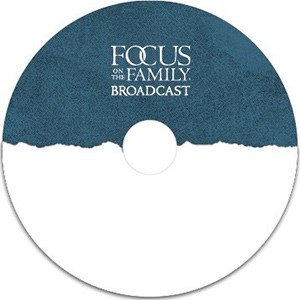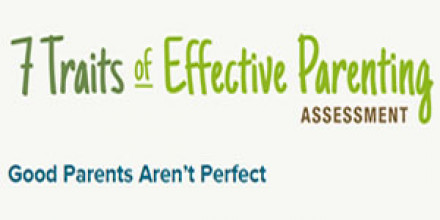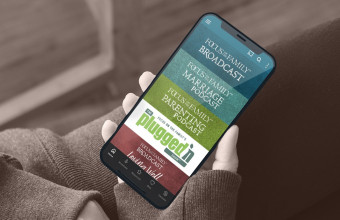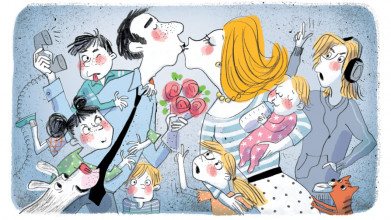
Simple Steps to Improve Your Marriage
Authors Matt and Lisa Jacobson describe how seemingly minor decisions can impact on your marriage and offer practical suggestions to help your marriage thrive.
Home » Episodes » Focus on the Family with Jim Daly » Leaving a Legacy of Love
Preview:
Bill Butterworth: It’s as if God were answering my question by saying, “You want something important to teach your kids, I’ll give ya three things: faith, hope, and love. You want the gold medal winner out of the three, choose love.”
End of Preview
John Fuller: Well, you’re gonna hear how to demonstrate love in your family with a fun presentation from our guest today on Focus on the Family. That’s Bill Butterworth. Welcome to the program. I’m John Fuller and your host is Focus president and author, Jim Daly.
Jim Daly: John, Bill Butterworth has a lighthearted message to share with us that contains some important truths about showing love to those around us. Uh, he’s an author and much sought-after speaker, and most importantly, the father of five adult children with 11 grandchildren.
John: That is quite a crew and, uh, here now is Bill Butterworth on today’s episode of Focus on the Family.
Bill: I wanna tell you about a very important moment in my life. Uh, sociologists talk about significant emotional events when, you know, you’re just not the same after they happen, and there’s some that we’ve all experienced but then there are in- individual ones that mark us as people and we’re never the same. For me, it took place, very simply, it was the first words, uh, of my youngest child. There are five Butterworths in the Butterworth family: Joy, Jessie, Geoffrey, John, and Joseph. Uh, so now you know why we travel. But, um-
Audience: (laughs).
Bill: … when Joseph was getting ready to speak, it was a big event. Now, where are the parents out there? Any parents willing to raise their hands? Okay. Very popular here. All right. How many of you had parents? Would you raise your hand?
Audience: (laughs).
Bill: Okay. Huh, not as many, but anyway, um-
Audience: (laughs).
Bill: You know how this whole parenting thing works, right. When our first child came along, Joy, we were typical first-time parents. This kid’s gonna walk at six months. This kid’s gonna talk at eight months. This kid’s gonna talk another language at nine months. This kid’s gonna have a Stanford application already filled out at ten months. This kid, you know, just all the pressure, all the stress. Putting it on that first kid. Well, by the time you have five, you learn to lighten up. Y- you learn a lot about parenting. I can remember when Joseph came along, thinking to myself, “That kid can walk whenever he wants. That kid can talk whenever he wants.” I don’t care if he’s 12. If he can get in and out of that diaper on his own-
Audience: (laughs).
Bill: … I have no problem with that. There is no pressure on this guy. We’re not gonna have any problems. So, I remember, uh, that this was not the, um, so much a big deal to me when he was gonna start to talk. But i- it’s as if God grabbed it and grabbed ahold of me and said, “You better pay attention ’cause this kid’s got a message for you.” ‘Cause see, kids kinda learn how to talk two different ways, I’ve observed. The- the most common one is they kinda accidentally stumble into it, right. They’re sitting there one day, goo goo ga ga minga a gon nung no mo broccoli.
Audience: (laughs).
Bill: The kid is speaking, listen to that. And there’s this other method, where it’s almost like they just have an on switch flipped and they just start speaking, perfectly. This is the way it was with Joseph. He spoke on a Monday night at dinner and the reason I remember it was Monday night at dinner is, when he was one year old, 1986, it was a very busy time for me. I thought I was more important than I probably shoulda thought. I was, uh, working Monday through Friday at Insight for Living with the Swindolls and I was counseling all week and Friday afternoon, I’d sneak out of my office in Southern California and I’d fly somewhere and I’d spend a weekend with a group like you. And oftentimes, my theme for the weekend would be, you need to spend more time with your family.
Audience: (laughs).
Bill: I’d fly back, my kids would already be in bed. I’d get up early Monday morning before they woke up to get into the office to make up for the time I missed, sneaking out early Friday afternoon. So, if you’re following me, sometimes it would be Monday night before I’d see my kids having only seen them the previous Thursday night when I tucked them into bed, and I’ll go ahead and give you the interpretation, that’s all wrong. That’s way too much. So, it’s Monday night, we’re at dinner. I haven’t seen my family since Thursday night. Joseph hits the on switch; it’s time to speak. I mean, to this day, I look in his eyes and I can still revisit this. He’s in his highchair, sitting between his mum and me. He turns and look at his mum. His face lights up with unmistakable clarity. He goes, “He- he- hey, Ma.”
Audience: (laughs).
Bill: And then he turns and looks at me. Face lights up, same unmistakable clarity. “He- he- hey, Bob.”
Audience: (laughs).
Bill: And his mom doesn’t miss a beat. She says, “Whoa, you been on the road too much.”
Audience: (laughs).
Bill: And I said, “Nevermind that. Who’s Bob?”
Audience: (laughs).
Bill: Well, I found out there wasn’t a Bob and I don’t know whether that was good news or bad news because then I realized, my son doesn’t even know who I am. He doesn’t call me Dad. He doesn’t even have the first name right.
Audience: (laughs).
Bill: I’m Bob. And my, uh, rest of my family’s telling me, “Dad, it was an innocent mistake. You gotta get a grip.” And I- I couldn’t. I just, I just went into this funk. I’m thinking, “Well, what right do I have to expect him to call me Dad. He doesn’t know who I am. He never sees me. I’m this all-important guy who’s gotta go out and do all this other stuff. I’m not being a good dad.” What a rotten thing to be communicating. I can remember sitting there weeks afterward, still in this kinda haze, and of course, Joseph has moved into the next phase of language. One of my favorite times, when a kid has, like, three or four favorite words, right, and they just say ’em, over and over again. He had three. If he wanted more to eat, he’d say, “More,” and if he wanted something to drink, he’d say, “Dink.”
Audience: (laughs).
Bill: And he, believe it or not, started calling me Bill.
Audience: (laughs).
Bill: And I thought this was good. I didn’t take it as disrespectful. After all, we started with Bob so I thought we were moving in the right way.
Audience: (laughs).
Bill: We’d get to Dad. We’d get to Dad. So, I’m there at the dinner table, trying to figure out why my son doesn’t even know who I am and he’s over there barking in the highchair, “More dink, Bill.”
Audience: (laughs).
Bill: Well, that was a big moment for me. I mean, I, I made some radical changes. I- I- I left my position at Insight for Living and started what has been a wonderful 15 years of speaking full-time all over the country. But he caught my attention that day and if I can freeze that moment for you and tell you about one other one and bring ’em together, you’ll see where we’re going this morning in the minutes that we have. Was many years later, was only a few years ago, I was sitting in my home in California and the phone rang and it was, um, from Philadelphia, where I had been born and raised, and the message was, your father has suddenly passed away. Uh, would you come to Philadelphia and preach his funeral, which, of course, I was pleased and privileged to be able to do, although I was deeply crushed at the, uh, the death of my father. I didn’t expect it whatsoever. So, I flew to Philadelphia and it’s that, uh, situation where I’m behind a lectern and my father’s body is lying in a casket right next to me and I’m the family representative who was supposed to tell everybody what my father has passed on. What he has left behind, his legacy if you will. Not his stock portfolio, not what’s in the will, not the real estate, but the real inside stuff. What did my dad teach me that outlives him, that goes on? And fortunately for me, my dad was one of my heroes, so it was a very easy speech to give from that vantage point. But any parent in the room probably knows where I’m going with this. I couldn’t help but think, you know, one of these days, it’s gonna be all different. I’m gonna be over here and one of the five kids is gonna be elected as the representative. What are we gonna say about our dad? Now, that kinda sent a shiver up my spine ’cause I realize, you know, my kids can give you a, a grocery list of things I don’t do well. You know, don’t let Dad near a checkbook if you want it to be balanced. Dad is not healthy around power tools. You know, Dad is, uh, you know.
Audience: (laughs).
Bill: I- just don’t put him in these kinds of situations. There’s a lot they can say that I don’t do well. And I couldn’t think of what they would say that I did do well. And I thought, “Well, I’d better figure out something that’s gonna be significant.” So, I thought, “What is it that is important to God?” I mean, what will outlive me? What will outlive you, that’s significant. And I was drawn to a, a chapter that I’d memorized as a child in Sunday school. You may even know it. It’s the thirteenth chapter of First Corinthians, where Paul ends with this beautiful summary, now abide faith, hope, and love, these three, but the greatest of these is… Somebody tell me.
Audience: Love. Love.
Bill: Love. You know it. It’s as if God were answering my question by saying, “You want something important to teach your kids, I’ll give you three things: faith, hope, and love. You want the gold medal winner out of the three, choose love. Love your kids, man. And that will outlive you.” So, I thought, “Man, that’s what it is.” And so, I’ve set this out, as this is- this is to be my legacy. If I have anything to do with it, that my kids can say, “You know, my dad did an awful lot wrong, but I’ll tell you one thing we knew about him, our dad always loved us. We always knew it. He always showed us. He was a good man.” What does love look like from God’s standard? If God is saying to you, make love your legacy and allow it to fuel your relationships, what does love look like? Well, there’s a wonderful little passage in First Thessalonians that I want to read to you and then give you some very simple points to follow as we look at this this morning. It’s First Thessalonians 4, verses 9, 10, and 11. “Now, as to the love of the brethren,” it says, “you have no need for anyone to write to you because you yourselves are taught by God to love one another. You practice love towards all the brethren who are in all Macedonia. We urge you to excel still more, making it your ambition to lead a quiet life.”
John: You’re listening to Bill Butterworth on Focus on the Family and we have a CD of this program for you. It has extra content. It’d be great to listen to again or pass on to a friend. Uh, we’re making that available when you contribute to the ministry, either a monthly pledge or one-time gift of any amount. You can do that when you call 800-A-FAMILY, 800-232-6459, or donate and request that CD at focusonthefamily.com/broadcast. Let’s go ahead and return now to more from Bill Butterworth.
Bill: So, if you’re a note-taker, let me give you three points on how people will know you’re a loving person. Point number one, loving people know that love is a top priority. One of my most favorite invitations, I often get invited to go on to Christian college campuses and speak to the college students, and they have this wonderful quaint, old custom on a lot of Christian college campuses. It’s a required meeting that they call chapel, and that’s where you speak. You speak to the whole student body. It’s required. You’re guaranteed a full house. They go in and wake these kids up. There’s guns, there’s handcuffs, there- you know. I mean, it’s, it’s a very religious experience.
Audience: (laughs).
Bill: So, I know I can do all right in chapel ’cause everybody’s there. But they all, the person will often say, “Why don’t you stay over and do a little voluntary session that night.” Well, nobody comes to voluntary sessions when you’re in college. So, I decided I gotta come up with a really good topic. So, somewhere during chapel, I’ll say, “Hey, if you have any free time tonight, come on back out tonight. We’re gonna answer the question, how to know if you’re really in love.” Whoosh, you know. The place is packed ’cause, like, all the girls are saying, “Well, you know, I think Edgar’s the one, but I have questions. There are issues. There uns- I have doubts. I just don’t know.” And Edgar’s like, “Uh-huh, uh-huh, uh-huh.”
Audience: (laughs).
Bill: So, everybody’s there. And what I tell these college students is, you know, what y- what we need to understand is, there are many aspects of love. There’s a physical aspect of love. That aspect that says, woo, I like this person. I wanna hold their hand. I wanna put my arm around her. I wanna hug him. I wanna kiss him. Et cetera, et cetera. And in God’s grand scheme, in the right context, even the et cetera, et cetera is all his design. It’s a beautiful thing. But that’s not all there is to love. There’s the emotional aspect of love. Women are way ahead of us guys. This is why a woman says, “Oh, my boyfriend walks through the door, hoo hoo hoo, you know, I get lightheaded and my knees get weak and I get butterflies in my stomach.” And guys, we try to respond in kind, “Yeah, yeah, yeah. I see you across the hall and I’m like, nauseous.”
Audience: (laughs).
Bill: Doesn’t have quite the effect that it does when your girlfriend or your wife says it to you, huh.
Audience: Yeah.
Bill: Okay. But that’s usually where it stops. God has a whole ‘nother level of love that’s the key to all this. And that’s what I call the volitional aspect of love. We choose to love. I can love you when you are just so cute and lovable and huggable, and I can also love you when you are unlovable. Anybody got an unlovable person in your life? Don’t raise your hand, they might be here.
Audience: (laughs).
Bill: You know the strain, the drain. I gotta love that person again. Now, this is where you’d expect a father of five to go through a, a litany of stories about the kids. Four of my five are boys, let’s just talk about boys at that teenage stage. You know, the fumes alone are enough to kill ya-
Audience: (laughs).
Bill: … and you just wonder then, l… I would tell those stories, my kids would often be with me and I’d see ’em kinda sink in deeper, deeper in the seats, you know, in the way, “Oh, thanks, Dad, thanks for sharing that story. I’m glad that,” uh, you know, “thousands of people know I’m an idiot now.”
Audience: (laughs).
Bill: “You’re a good man, Dad.”
Audience: (laughs).
Bill: So, one day on a lark, I asked myself what I thought was a frivolous question. It was, I wonder if my kids ever have to choose to love me in an unlovable state. (laughs).
Audience: (laughs).
Bill: And I thought of, like, one thing, which led to six, which led to four pages, which led to several hours, I mean, I was getting depressed. It’s like, I gotta stop. I can’t believe this. My kids are constantly being put in a position where they gotta love me when I’m not all that lovable either. Pretty scary, huh. We lived in Southern California for years and then we moved up to Northern California. We left Orange County and moved up to a tiny little town just below Lake Tahoe. Very small, not a lot of stuff going on. I remember my oldest son was so excited about the first spring up there so he could play Little League. And he’d come from Orange Country, you know, Orange Country Little League. Man, it’s primo. I mean, you get uniform day, you get an exact replica of what the pros wear. I mean, if you’re in the Little League Dodgers, it’s like you got a professional Dodger uniform that was simply left in the dryer too long.
Audience: (laughs).
Bill: I mean, it’s precise, you know. So, we’re up in Northern California, it’s uniform day and the coach says get in line to get your T-shirts. And my darling, little, naïve son turns around and looks at me, “Dad, they give out T-shirts to wear under the uniforms.” You know, he didn’t have a clue. The T-shirt is it. “Oh, Dad, talk to the coach.” I go over to the coach, “Is this it?” And he said, “Well, you gotta buy him a hat but yeah, this is it.”
Audience: (laughs).
Bill: Little League on a budget. Well, I had no idea what the budget was. Like, I go to the first game and that’s where I really got rocked, okay. You’re in the stands, the baseball field’s out there, right, home plate, you’re all right behind. Right before the game, the two adult coaches come out to home plate, shake hands, let’s have a good game. They turn and look at the stands and to my horror, they start going, “I’ll take you, sir. I’ll take you. I’ll take you, sir.” I start mumbling to the kids next to me, “What’s going on?” And one of my boys says, “Dad, they’re picking umps.”
Audience: (laughs).
Bill: I said, “They don’t even pay for umps around here?” “No, no, no, they just pull ’em outta the crowd.”
Audience: (laughs).
Bill: Well, I’m like, “Oh no. I know they’re gonna pick me.”
Audience: (laughs).
Bill: I can’t do this. This is too much stress. How can they put me out there when my son’s playing? Am I ever gonna call my son out? Is he ever gonna hit a foul ball? Is he ever not gonna be safe? I mean, you can’t do this to me. I can’t stand the stress. I can’t stand the pressure. Somebody help me here. So in good Victorious Living style, I was up for seven straight nights. Couldn’t sleep. I know they’re gonna pick me. I know they’re gonna pick me this weekend. I know they’re gonna pick me.
Audience: (laughs).
Bill: Next Saturday, sure enough, the coaches come out, they shake hands, let’s have a good game. “I’ll take you, sir. I’ll take you, sir.” And boy, he looks at right at me. “I’ll take you, sir.” Well, fortunately, I had seen that finger point at me a thousand times in the seven sleepless nights and I was prepared. No sooner did he say, “I’ll take you, sir,” I stood up and confidently replied, “[German].”
Audience: (laughs).
Bill: Which, of course, is German and if you speak German, you realize I just said, “I can’t understand you because I believe my mother is broken.”
Audience: (laughs).
Bill: Well, the poor coach, he’s like the deer in the headlights. He’s just kinda frozen there at me and he turns and looks at my kids and he says, “Your dad doesn’t speak English?”
Audience: (laughs).
Bill: And I can see my kids looking up at me like this is the moment.
Audience: (laughs).
Bill: And do we choose to love the unlovable or do we let the guy fry.
Audience: (laughs).
Bill: Right? You’ve been there. And God bless ’em, my dear kids, they just look over at the coach and they go. And the coach is like, “Well, I’m sorry, we can’t have someone who doesn’t speak English. Nevermind.” And they didn’t pick me for the whole rest of the season. It was great.
Audience: (laughs).
Bill: But my poor kids, they’re in school, their classmates are saying, “Your dad doesn’t speak English?”
Audience: (laughs).
Bill: “What does he do?” And they’d say, “He’s a speaker.”
Audience: (laughs).
Bill: Love is an act of the will. So, point number one, loving people know that love is a top priority. Number two, loving people know love takes practice. Loving people know that love takes practice. Verse 10 says it, “You practice love towards all those in Macedonia. We urge you to excel still more.” Love takes practice. It’s not something that you master once and for all and then you don’t have to work on it again, ever again. This verse tells me, first of all, that love is in the context of a relationship. You practice it towards all those that are in Macedonia. May your love be practiced and excel still more. When’s the last time you did an unselfish demonstrative act of love to someone that you love? Maybe you need to do that. Now, if they’re here, you’ll do that and they’ll say, “You’re only doing that because the blond guy told you to do it in church.”
Audience: (laughs).
Bill: So, you might need to have a backup so that they know, whoa, you [inaudible] too. All right, this is good.
Audience: (laughs).
Bill: But anything is better than nothing. Demonstrate love, practice love. Loving people know, number one, that love is a top priority, number two, that love takes practice. The third one I want you to consider as we wrap this up, is that loving people know love’s tremendous power. Loving people know love’s tremendous power. The verse 11 says, “Make it your ambition to lead a quiet life.” Now, that’s interesting, that doesn’t mean a life of silence, the life of a librarian. The word quiet means a settled life. The 21st century synonym would be make it your goal to lead a life that is stress-free. How do I live life above the stress level? You don’t. God lives it through you. You now have the power of God in you. Now, I mean, you still show up, you’re still breathing, you’re still making decisions. I don’t mean to take us completely off the hook. But do you understand what I’m saying? The Bible teaches that when you and I come into relationship with God, when we trust Jesus Christ as our Savior, we are born into God’s family and God literally comes and lives inside of us. What a beautiful thing. And because he lives inside of us, now as we yield to him inside of us, he loves through us. So, I can love that unlovable roommate, neighbor, boss, spouse, child, parent, grandparent, grandchild, uncle. I can love that person because God is loving through me. And I can live above stress because God’s love, not only works through me, but works through the people that are around me. No more do you see God’s love demonstrated in a higher form than when we go through difficult times, right. For me, my world hit bottom 10 years ago. After 17 years of marriage, it was over. All of a sudden, I’m divorced. It’s not what I wanted. I’m thinking, “I’ve got all these kids. What am I gonna do with these kids?” This isn’t supposed to happen to people like me. I’m a good guy. This happens to mean guys, people that beat up people and cheat on people. I’m a good guy. This shouldn’t happen to me. But it did. And I remember thinking, “How am I gonna get through this?” And, you know, consequently, after eight years of being single again, God brought Cathy into my life. And we began to see, you know, there was so much to be learned, not only about our love between one another, but during those single years, and she could tell you the same story, it’s all about God’s love being shown through the friends in our life. Friends that would circle around me and say, “We’re not gonna let you go through this by yourself.” That’s why God gives us friends that just kinda put their arms around you. And they don’t have all the answers and I’m sure for my friends, it was a very ugly assignment. Well, I gotta go over and talk to Bill. He’s a mess. All he does is cry and, you know, drip water everywhere, you know, it’s, it’s sad.
Audience: (laughs).
Bill: It’s, to see a person like him, it’s sad. It’s- it’s- it’s brutal. But, I’ll go do it because I love him. And we can bring him through it. And you know what that’s all about, some of you. ‘Cause you know the pain of being left, or- or- or being lost or being, just somehow given that feeling of unloveliness. And I don’t deserve to ever love again. God says, “Wrong. You do. I’m gonna love you even when it hurts.” That’s love’s tremendous power. That can only come from Him. See, love is a top priority. It is something that takes practice, but as we realize that God can love through us and give us that tremendous power. Then, even when life doesn’t turn out like we’ve planned, we can begin to see sense made of it again and we can learn to love again, the way God wants us to.
John: That’s Bill Butterworth on this edition of Focus on the Family, reminding us that when the people around us feel broken, we just need to be the hands and feet of Christ and minister love to them. And, of course, Bill experienced a caring community himself and he’s now committed to sharing that legacy with those around him.
Jim: Uh, John, sometimes we just make it too difficult, don’t we?
John: Mmhmm.
Jim: Uh, as Bill pointed out there in First Corinthians, the apostle Paul wrote that three things remain: faith, hope, and love, and what was the greatest?
John: Well, that was love.
Jim: (laughs) right.
John: Yeah.
Jim: And, of course, we have to balance that out with respect and discipline and all those things. Uh, sometimes, some firmness as parents is required but the bottom line is this: when you’re at a loss for how to reach that rebellious child or you don’t know what to say to the grieving widow next door or you’re not sure how to respond to that person going through a tragic divorce, like Bill was, uh, start by loving them. Make it a priority. Practice living that way and then just watch. You’ll begin to see God’s enormous emerge in that situation and that relationship.
John: Yeah, and we’ve seen, uh, personally, Jim, and certainly here at the ministry, we hear from so many people who experienced that very thing.
Jim: Uh, we sure do, John, and that’s why we wanted to air this program, to remind those of you who are listening right now, that the world would be a better place if we can fill it with God’s love. That’s our ultimate goal. You know, over the past 12 months, over 700,000 parents said that Focus on the Family helped them build a stronger family by providing resources that help them love their children well, while also providing advice on discipline and the other important parenting matters. So, let me gently remind you, we are a listener supported ministry. We rely on your gifts to make all of these resource available 24/7. Can I ask you to consider giving back to Focus on the Family if we’ve helped you. The best way to partner with us is through a monthly pledge. That really helps us even out the budget over the year, and if you can make a pledge of any amount today, I’d like to send you a CD of this complete message from Bill Butterworth as our way of saying thank you for being part of the ministry, and that CD will have extra content that we just couldn’t get to today. And if you can’t make a monthly commitment right now, we understand that. Uh, we can also send the CD if you can provide a one-time gift of any amount. Just get in touch with us today.
John: And you can reach us when you call 800-A-FAMILY, 800-232-6459, or donate online and request your CD at focusonthefamily.com/broadcast. And when you’re online with us, be sure to check out our free parenting assessment. Uh, those results should encourage you and they might surprise you as well. Takes just a few minutes and, uh, we’ll link over to it. I hope you can be back next time as Debra Fileta explores the healing process and what it means to be healthy in every aspect of your life.
Teaser:
Debra Fileta: In this world, we will go through hard things, you know, and, and to be able to face those with confidence and, um, acknowledge those hurts, make space for them, is one of the ways that we heal.
End of Teaser

Bill Butterworth is an award-winning communicator sharing hope, laughter, and motivation to love others with audiences throughout North America. He holds Masters’ degrees from both Dallas Theological Seminary and Florida Atlantic University. As a writer, Bill contributes to major magazines and has written or ghostwritten over 40 books. His most recent release is entitled Everyday Influence. Bill and his wife Kathi have five adult children and 11 grandchildren, and reside in Texas. Learn more at www.billbutterworth.com.

Receive a CD copy of today’s broadcast with your donation of any amount! Plus, receive member-exclusive benefits when you make a recurring gift today. Your monthly support helps families thrive.

There's no parenting formula to follow, but there are ways you can grow every day. This assessment gives parents an honest look at their unique strengths, plus some areas that could use a little help.

Listen to the Focus on the Family Broadcast, discover more podcasts, and find help for your family at your fingertips.

In this first article of Shaunti Feldhahn's three-part series, she shares how believing the best about your spouse, even when you're hurt, makes for a happier marriage.

How is your marriages equipping your kids with the skills they need for interacting with their future spouses?

Here are some intentional decisions you can make to keep marriage a priority in your blended family.

Focus on the Family's staff of licensed, professional counselors can help you bring healing and restoration to your family with Christian perspectives you can trust.

Authors Matt and Lisa Jacobson describe how seemingly minor decisions can impact on your marriage and offer practical suggestions to help your marriage thrive.

As a believer in Jesus Christ, you are called to live a life of kindness in a turbulent culture. Dr. Barry Corey, President of Biola University, discusses what kindness is according to the Bible and what it can look like on a practical level. Barry shares how his dad modeled a life of being receivable to others, and he also talks about the importance of having a firm center (theological convictions) with soft edges (kindness).

Kids are no strangers to big emotions. And this can be scary for parents to navigate. Michelle Nietert is a licensed professional counselor, author, and mother of two. With personal stories and expert advice, Michelle provides practical and faith-based tools for parents to guide their little ones through emotions – big and small!

Larnelle Harris shares stories about how God redeemed the dysfunctional past of his parents, the many African-American teachers who sacrificed their time and energy to give young men like himself a better future, and how his faithfulness to godly principles gave him greater opportunities and career success than anything else.

Amy Carroll shares how her perfectionism led to her being discontent in her marriage for over a decade, how she learned to find value in who Christ is, not in what she does, and practical ways everyone can accept the messiness of marriage and of life.

Psychologist Dr. Kelly Flanagan discusses the origins of shame, the search for self-worth in all the wrong places, and the importance of extending grace to ourselves. He also explains how parents can help their kids find their own sense of self-worth, belonging and purpose.